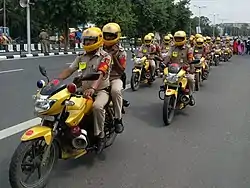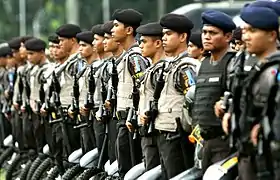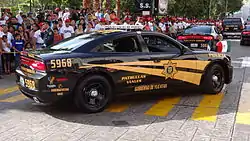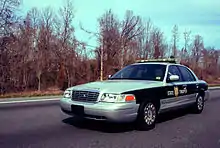
_(10585073613).jpg.webp)
State police, provincial police or regional police are a type of sub-national territorial police force found in nations organized as federations, typically in North America, South Asia, and Oceania, mostly Australia, United States, India, Canada and United Kingdom, because each of their state police are mostly at country level. These forces typically have jurisdiction over the relevant sub-national jurisdiction, and may cooperate in law enforcement activities with municipal or national police where either exist.
Argentina
In Argentina, as a federal country, each province has its own independent police force and its responsible of its funding, training and equipment. State police agencies are responsible of all the territory of a determinate state. There is almost no municipal/local law enforcement in Argentina, and if there is, they are generally limited to traffic duties.
Australia
Prior to the Federation of Australia, each Colony within Australia had numerous police forces, but these were largely amalgamated well before Federation.
Today each state of Australia, as well as the Northern Territory, has its own state police force.[1][2] Municipalities do not have police forces and it is left to the state forces to police all geographic areas within their respective states. Australia does have a national police force, the Australian Federal Police, whose role is to enforce the laws of the Commonwealth, both criminal law and civil law, as well as to protect the interests of the Commonwealth, both domestically and internationally. The AFP does, however, provide policing for the Australian Capital Territory, Jervis Bay Territory, and Australia's other external territories such as Norfolk Island, Christmas Island and the Cocos (Keeling) Islands.[3]
The state and territory police forces are:
Brazil
Each state in Brazil has two main state police corporations that work together:
- Civil Police — The nonuniformed state judiciary and criminal investigation police, which is mainly based on agents and delegates.
- Military Police — The uniformed and militarily hierarchical police officers work in a gendarmerie system and perform police functions of patrolling, approaching and capturing. They are a reserve branch of the Brazilian Armed Forces (mainly the Brazilian Army) and make up the majority of the police force in Brazil.[4] But they do not perform regular Military Police functions, as they are performed by Brazilian Army police officers on duty, such as the Army Police (Brazil), because the Military Polices of the Brazilian states are subordinate to the Brazilian Army.
- PCAC - Civil Police of Acre State
- PMAC - Military Police of Acre State
- PCAL - Civil Police of Alagoas State
- PMAL - Military Police of Alagoas State
- PCAP - Civil Police of Amapá State
- PMAP - Military Police of Amapá State
- PCAM - Civil Police of Amazonas State
- PMAM - Military Police of Amazonas State
- PCBA - Civil Police of Bahia State
- PMBA - Military Police of Bahia State
- PCCE - Civil Police of Ceará State
- PMCE - Military Police of Ceará State
- PCDF - Civil Police of the Federal District
- PMDF - Military Police of the Federal District
- PCES - Civil Police of Espírito Santo State
- PMES - Military Police of Espírito Santo State
- PCGO - Civil Police of Goiás State
- PMGO - Military Police of Goiás State
- PCMA - Civil Police of Maranhão State
- PMMA - Military Police of Maranhão State
- PCMT - Civil Police of Mato Grosso State
- PMMT - Military Police of Estado do Mato Grosso State
- PCMS - Civil Police of Mato Grosso do Sul State
- PMMS - Military Police of Mato Grosso do Sul State
- PCMG - Civil Police of Minas Gerais State
- PMMG - Military Police of Minas Gerais State
- PCPA - Civil Police of Pará State
- PMPA - Military Police of Pará State
- PCPB - Civil Police of Paraíba State
- PMPB - Military Police of Paraíba State
- PCPR - Civil Police of Paraná State
- PMPR - Military Police of Paraná State
- PCPE - Civil Police of Pernambuco State
- PMPE - Military Police of Pernambuco State
- PCPI - Civil Police of Piauí State
- PMPI - Military Police of Piauí State
- PCERJ - Civil Police of Rio de Janeiro State
- PMERJ - Military Police of Rio de Janeiro State
- PCRN - Civil Police of Rio Grande do Norte State
- PMRN - Military Police of Rio Grande do Norte State
- PCRS - Civil Police of Rio Grande do Sul State
- BMRS - Military Brigada of Rio Grande do Sul State (The only military police in Brazil that does not use the name "Polícia Militar" but rather "Brigada Militar")
- PCRO - Civil Police of Rondônia State
- PMRO - Military Police of Rondônia State
- PCRR - Civil Police of Roraima State
- PMRR - Military Police of Roraima State
- PCSC - Civil Police of Santa Catarina State
- PMSC - Military Police of Santa Catarina State
- PCESP - Civil Police of São Paulo State
- PMESP - Military Police of São Paulo State
- PCSE - Civil Police of Sergipe State
- PMSE - Military Police of Sergipe State
- PCTO - Civil Police of Tocantins State
- PMTO - Military Police of Tocantins State
Canada

Law enforcement in Canada operates at the federal, provincial, and local levels. Three provinces of Canada have a dedicated police force, with jurisdiction over some or all of the province:
- Ontario Provincial Police (Ontario: provincial highways and waterways, provincial government buildings and officials, unincorporated areas)
- Royal Newfoundland Constabulary (Newfoundland and Labrador: St. John's Metropolitan Area, Corner Brook, Bay of Islands, Humber Valley, and Labrador West)
- Sûreté du Québec (Quebec)
The federal Royal Canadian Mounted Police (RCMP) provides provincial-level policing in the remaining land area of Newfoundland and Labrador, as well as the remaining seven provinces and three territories. The RCMP began being contracted to provide provincial policing in the late 1920s as provincial police forces were disbanded and their duties contracted out to provincial divisions of the RCMP. The most recent provincial police force to be disbanded, the British Columbia Provincial Police, existed from the mid-19th century until its jurisdiction was transferred to RCMP "E" Division on August 15, 1950.
Provinces which have disbanded their provincial police may retain other provincial law enforcement agencies, such as sheriff services or conservation officers. For example, the Alberta Sheriffs Branch is responsible for traffic enforcement in Alberta together with the RCMP, despite being a law enforcement agency and not a police force.
Germany

The Landespolizei (or LaPo) is a term used in the Federal Republic of Germany to denote the law enforcement services that perform law enforcement duties in the States of Germany. The German federal constitution leaves the majority of law enforcement responsibilities to the 16 states of the country.
- Baden-Württemberg Police
- Bavarian State Police
- Berlin Police
- Brandenburg Police
- Bremen Police
- Hamburg Police
- Hesse State Police
- Lower Saxony Police
- Mecklenburg-Vorpommern Police
- North Rhine-Westphalia Police
- Rhineland-Palatinate Police
- Saarland Police
- Saxony Police
- Saxony-Anhalt Police
- Schleswig-Holstein Police
- Thuringia Police
There also are several auxiliary state police forces.
India

Each state and union territory has a state police force and its own distinct State Police Services, headed by the Commissioner of Police (State) or Director General of Police (DGP) who is an Indian Police Service officer. The IPS is not a law enforcement agency in its own right; rather it is the body to which all senior police officers of all states belong regardless of the agency for whom they work. The state police is responsible for maintaining law and order in townships of the state and the rural areas.
Indonesia

In Indonesia, Regional Police (Indonesian: Kepolisian Daerah) (commonly abbreviated as Polda) is the main implementing unit for the territory of the Indonesian National Police which is under the National Police Chief. Polda has the task of carrying out the National Police's duties at the regional level I, namely the Provinces. Polda is a direct extension of the National Police Headquarters. The Regional Police (Polda) is led by a Regional Police Chief (Kapolda) with the rank of Inspector General of Police (Irjen Pol.). The Regional Police consists of the Resort Police (Polres), which is in charge of the Sector Police (Polsek), which is in charge of the Bhayangkara Supervisor of Community Security and Order (Bhabinkamtibmas). The Polda is also tasked with organizing the formation and development of education for the Non-Commissioned Officer level whose operations are carried out by the State Police Education School (SPN), while for the Policewomen Officer level it is also carried out by the Women's Police Training Center for Police (Sepolwan Lemdiklatpol).
- Aceh Regional Police
- North Sumatra Regional Police
- West Sumatra Regional Police
- Riau Regional Police
- Riau Islands Regional Police
- Jambi Regional Police
- Bengkulu Regional Police
- South Sumatra Regional Police
- Bangka Belitung Islands Regional Police
- Lampung Regional Police
- Greater Jakarta Metropolitan Regional Police
- Banten Regional Police
- West Java Regional Police
- Central Java Regional Police
- Special Region of Yogyakarta Regional Police
- East Java Regional Police
- Bali Regional Police
- East Nusa Tenggara Regional Police
- West Nusa Tenggara Regional Police
- West Kalimantan Regional Police
- Central Kalimantan Regional Police
- South Kalimantan Regional Police
- East Kalimantan Regional Police
- North Kalimantan Regional Police
- North Sulawesi Regional Police
- Gorontalo Regional Police
- Central Sulawesi Regional Police
- West Sulawesi Regional Police
- South Sulawesi Regional Police
- Southeast Sulawesi Regional Police
- North Maluku Regional Police
- Maluku Regional Police
- West Papua Regional Police
- Papua Regional Police
Mexico

Each of the 32 states of Mexico maintains a separate law enforcement agency or Policía Estatal. Each of these state forces is tasked with the protection of their citizens, keeping local order and combating insecurity and drug trafficking. Certain states including Veracruz and Nuevo León have a new model of police force designated as Civilian Forces (Fuerza Civil).
- Aguascalientes State Police
- Baja California State Police
- Baja California Sur State Police
- Campeche State Police
- Chiapas State Police
- Chihuahua State Police
- Coahuila State Police
- Colima State Police
- Durango State Police
- Guanajuato State Police
- Guerrero State Police
- Hidalgo State Police
- Jalisco State Police
- Mexico City Police, a special case in both state and municipal duties throughout the 16 Boroughs of Mexico City
- State of Mexico Police
- Michoacán State Police (Replaced in 2020 with Michoacán State Highway Patrol)
- Morelos State Police
- Nayarit State Police
- Nuevo León Civil Force
- Oaxaca State Police
- Puebla State Police
- Querétaro State Police
- Quintana Roo State Police
- San Luis Potosí State Police
- Sinaloa State Police
- Sonora State Police
- Tabasco State Police
- Tamaulipas State Police
- Tlaxcala State Police
- Veracruz State Police (Replaced with Civil Force in 2014)
- Yucatán State Police
- Zacatecas State Police
Spain
In Spain there are autonomous police forces in four of its nineteen autonomous communities.
- Ertzainas in the Basque Country
- Mossos d'Esquadra in Catalonia
- Policía Foral in Navarre
- Policía Canaria in the Canary Islands
Apart from this, some autonomous communities (Andalusia, Aragon, Asturias, Galicia and Valencian Community) have a special division part of the National Police Corps and autonomous government of each community.
United States

In the United States, state police (also termed highway patrol, state patrol, or state highway patrol), or state troopers, are a police body unique to 49 of the U.S. states, having statewide authority to conduct law enforcement activities and criminal investigations. Hawaii, despite a widely dispersed archipelago and having four separate county-based police agencies, still has its own statewide police agency.
In general, these police agencies perform functions outside the jurisdiction of the county sheriff, such as enforcing traffic laws on state highways and interstate expressways, overseeing the security of the state capitol complex, protecting the governor, training new officers for local police forces too small to operate an academy, providing technological and scientific services, supporting local police and helping to coordinate multi-jurisdictional task force activity in serious or complicated cases in those states that grant full police powers statewide. A general trend has been to bring all of these agencies under a state Department of Public Safety. Additionally, they may serve under different state departments such as the highway patrol under the state Department of Transportation and the marine patrol under the state Department of Natural Resources.
Twenty-three U.S. states use the term "State Police", fifteen use the term "Highway Patrol", seven use the term "State Patrol", and three use the term "State Highway Patrol", while Alaska's agency is the "Division of Alaska State Troopers". The term "highway patrol" tends to be more common in the southeast and mountain west states. Hawaii is the only state with a Sheriff Division of the Hawaii Department of Public Safety with statewide jurisdiction.
- Alabama Highway Patrol
- Alaska State Troopers
- Arizona Highway Patrol
- Arkansas State Police
- California Highway Patrol
- Colorado State Patrol
- Connecticut State Police
- Delaware State Police
- Florida Highway Patrol
- Georgia State Patrol
- Hawaii State Sheriff
- Idaho State Police
- Illinois State Police
- Indiana State Police
- Iowa State Patrol
- Kansas Highway Patrol
- Kentucky State Police
- Louisiana State Police
- Maine State Police
- Maryland State Police
- Massachusetts State Police
- Michigan State Police
- Minnesota State Patrol
- Mississippi Highway Patrol
- Missouri State Highway Patrol
- Montana Highway Patrol
- Nebraska State Patrol
- Nevada State Police
- New Hampshire State Police
- New Jersey State Police
- New Mexico State Police
- New York State Police
- North Carolina State Highway Patrol
- North Dakota Highway Patrol
- Ohio State Highway Patrol
- Oklahoma Highway Patrol
- Oregon State Police
- Pennsylvania State Police
- Rhode Island State Police
- South Carolina Highway Patrol
- South Dakota Highway Patrol
- Tennessee Highway Patrol
- Texas Highway Patrol
- Utah Highway Patrol
- Vermont State Police
- Virginia State Police
- Washington State Patrol
- West Virginia State Police
- Wisconsin State Patrol
- Wyoming Highway Patrol
In addition, all the territories of the United States have a police force with similar territory-wide authority:
See also
References
- ↑ Barker, Cat (12 September 2018). "Crime and law enforcement: A quick guide to key internet links". Parliament of Australia. Retrieved 24 July 2022.
- ↑ "Australia's police forces [Abstract]". Police. 10 (7): 24–26. March 1978. Retrieved 24 July 2022 – via Office of Justice Programs (U.S.).
- ↑ "Our organisation". Australian Federal Police. Retrieved 24 July 2022.
- ↑ "Brazilian Laws - the Federal Constitution - Defense of State and Democratic Institutions". v-brazil.com.